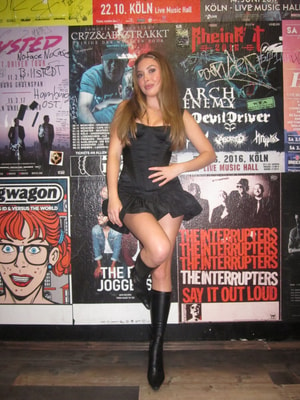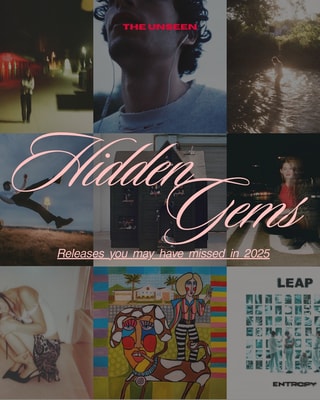A Coffeetalk with BitterBlau
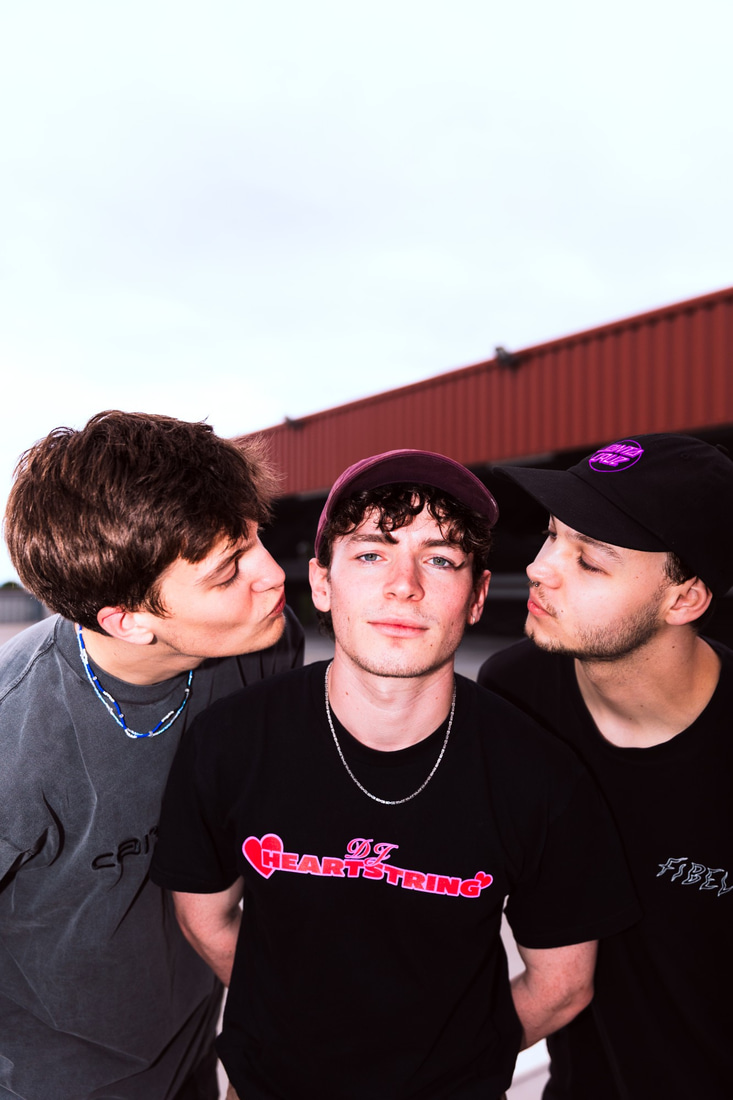
A while back, our Interviewer Mäx, met the German band BitterBlau for an Interview in their hometown area in Heidelberg (Germany). The location of this month's Coffeeshop Interview was Simons & Beans in Heidelberg. BitterBlau has a psychedelic-/dream-pop sound with many synthesizers and groovy guitar beats. The band's music is fresh, youthful, and full of character, with great lyrics that underline what music is generally about: feelings.
Check out their album "Welt in Mir", which includes their most known song, "Dancefloor," and many more.
Meet the Band: Dustin, Pascal & Lukas (left to right)
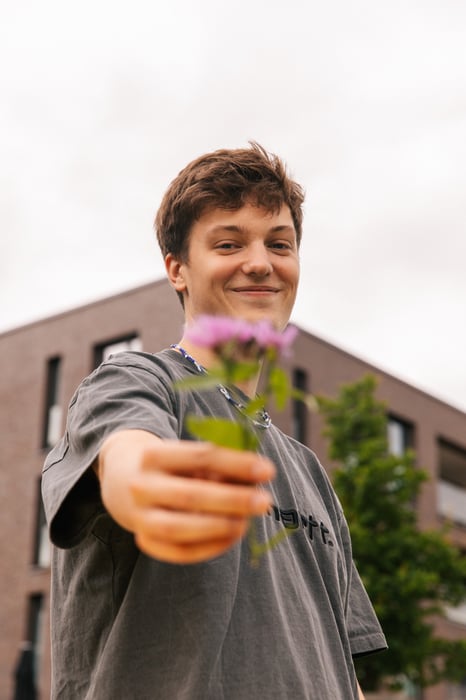
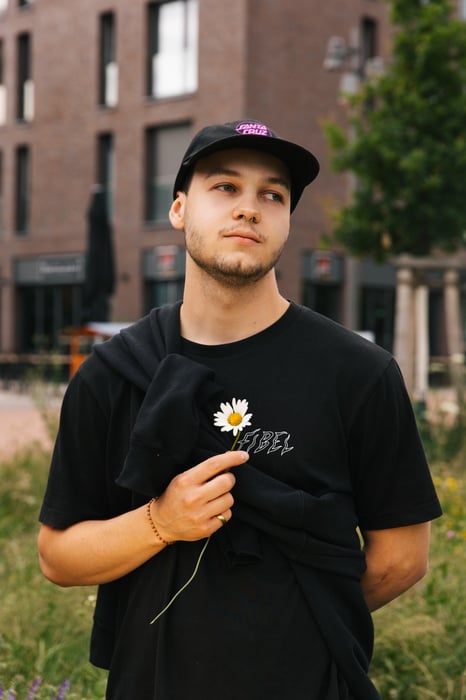
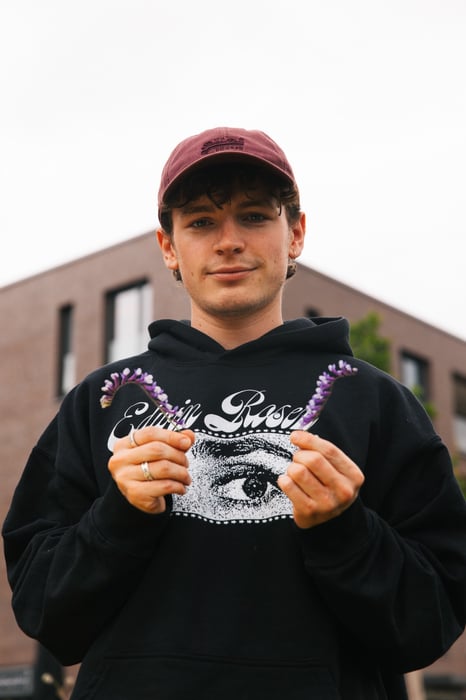
Where does the name "BitterBlau" come from? Was it a random idea, or is there a story behind it that you can share?
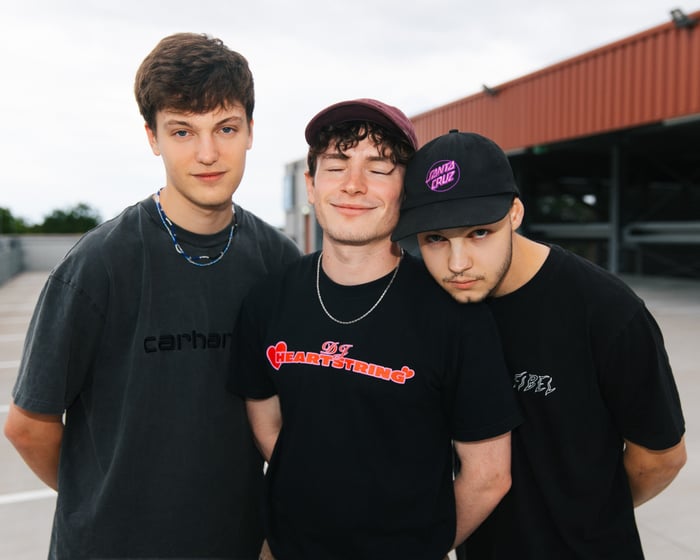
Dustin: It was important to me to include something related to synesthesia—the merging of two senses—in the name. Bitter is a taste, and blue is a color you see, and accordingly, it is also an alliteration—"BB." I think it rolls off the tongue well, and we thought it was a cool name.
Pascal: What I found cool about the name is that it immediately puts an image in your head. You instantly have a nice picture in your mind to think of.
Dustin: Exactly. Bitter and blue—you know the English expression "to feel blue," which is also associated with sadness and melancholy.
Mäx: I also immediately thought of a certain color when I heard of you. It’s a cool band name.
BitterBlau originally started as a solo project by Dustin. How did it come about that other band members joined?
Pascal: Dustin and I met through another band I had before. He attended one of our concerts, and we met there through another friend.
Dustin: Actually, Flo, our former bassist, messaged me on Instagram. I had posted a reel for our first single there. He said he liked what I was doing musically and invited me to one of their band's concerts. That’s where I met Pascal.
Did you switch bands, Pascal?
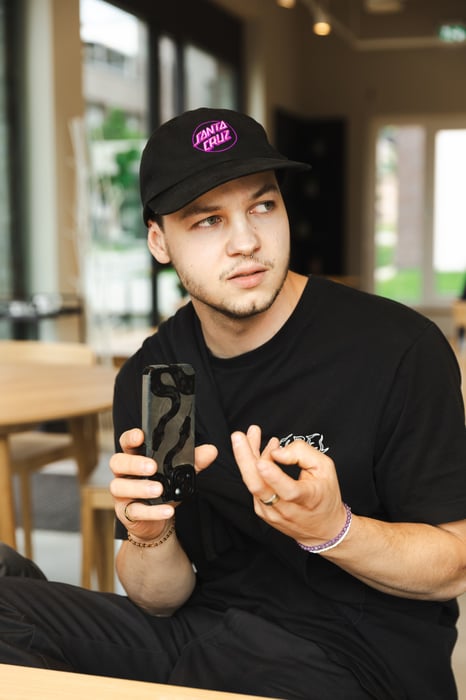
Pascal: No, the band continued. I had already seen Dustin's content on Instagram but couldn’t respond at the time because I was working. I saved it to look at later but never got around to it until he followed me after the concert he attended. Then I checked out his Insta and thought: Oh, I’ve seen this before. I liked the music and messaged him to see if we could record drum lines together. We met, and at first, Dustin didn’t realize it was about his music; he thought it was for the other band I was playing in. So, he came a bit unprepared.
Dustin: But it was still great!
Pascal: At the time, I was in two other bands. The switch happened as we worked together on the album. Initially, it was just about me helping with recording. But because I immersed myself in the album and was able to creatively contribute, which is a great honor, a really good friendship developed. There was no question about whether we wanted to perform live in this configuration; it was just clear.
Lukas, how did you come into the picture?
Lukas: Yeah, how do I start? I'm Lukas, and I play synthesizer. I also met Pascal through his old band. My Band “Kabinett”, where I play the drums, used to often play gigs together with “Gap in the Clouds”, where Pascal has since left. We were also part of the "Band Support" program by the city of Mannheim about three years ago. We performed together here and there, and about a year ago, I started writing songs myself. I asked our former Band support coach—shoutout to Rainer—if he knew anyone who produces music. I was looking for someone to realize my musical vision and to spice it up sound-wise. Rainer referred me to Dustin, who later joined the Band Support program. I messaged Dustin, and from there, we worked on my project, and I joined BitterBlau about six months ago. Since then, we’ve spent a lot of time together, which is very nice.
Pascal: The story behind it is also a bit funny. We were at the Electric Pony Club festival organized by Delta Konzerte. Lukas and I were there as listeners and saw an artist who inspired the three of us—Rar. This inspiration led to the growing idea of expanding BitterBlau. Dustin and I were already talking about adding another band member, as it was generally difficult to reproduce the album’s sound live with just the two of us. We needed more musicians to bring in more synthetic elements. Initially, I thought of adding a guitarist. I asked Lukas at the concert if he knew any guitarists. He said no, but he’d learn it if we gave him time. Lukas is a multi-instrumentalist who can do everything. In the end, he returned to playing synthesizer.
Fabio: I’m part of the team and handle the technical side in the background. I actually met Pascal through Bumble Friends. We started chatting in February and then met up. I knew he made music and was familiar with the band. I met Dustin at Pascal's birthday. I attended their gigs frequently and eventually started helping out, and now I’m helping out wherever they need me .
Lukas, did you bring in the synthetic sound, or did they already have it?
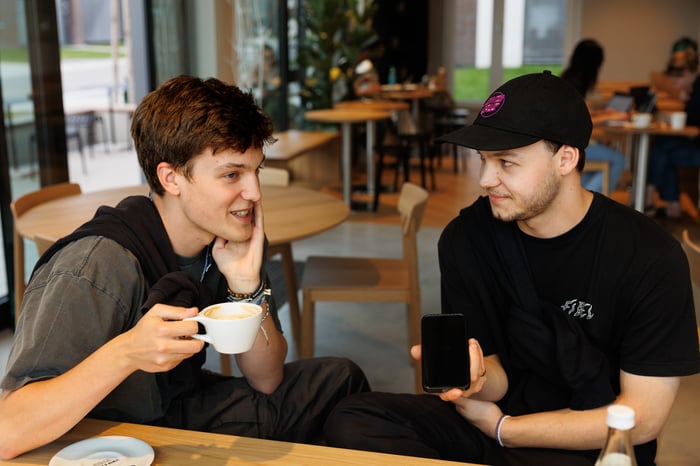
Lukas: They already had it. Dustin shaped the sound a lot.
Pascal: Yes, and he has a very good vision of how the songs should turn out. Essentially, he played everything on the album except the drums. That’s where I came in and got to express myself a bit. Dustin is also the first person I worked with who had a good sense for drums. Most of the parts I played were already very close to how he wanted them.
If you were to describe your music to new fans and listeners, what would you say makes your sound special or different?
Dustin: I would describe the sound as dreamy.
Pascal: Yes, we call it Dreampop.
Dustin: Initially, I tried to incorporate more psychedelic sounds, focusing on ear candy and ear-catching elements, and tried to be creatively expressive.
Pascal: We experimented a lot.
Dustin: I definitely didn’t want any song to sound like another. Sometimes it gets rocky, but it’s mainly synth-heavy.
Lukas: When Pascal goes crazy with his drumsticks, it can also get funky.
Dustin: Yes, that’s true too.
Pascal: I’d say it’s dreamy, very heavy on the effects, very experimental. We just try a lot of things, and sometimes wild stuff comes out, which is very cool. I think the sound is very pictorial because of the lyrics. I find them awesome, and they paint real pictures in your head. That’s super important to me in music in general, especially with German lyrics, that they create images in your head.
Dustin: It’s also important to me that the lyrics are honest.
So, would you say the lyrics come from your own experiences?
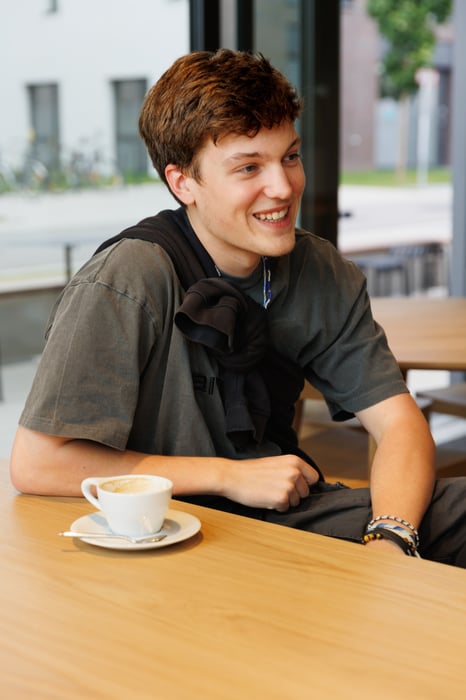
Pascal: Yes.
Dustin: Of course, you draw inspiration from your own life and process personal experiences in the lyrics. Therefore, I draw more inspiration from sadness than from happy moments. That’s why many songs have a melancholic touch. That doesn’t mean all the songs are sad.
Mäx: I find it interesting that your beats are very upbeat. It makes you want to move and run, but the lyrics paint a different picture.
Pascal: Bitter.
Maybe it’s also this synesthesia of the emotional world that’s created.
Dustin: I think it’s cool to dance to something that’s actually sad and embrace that sadness and not feel bad if life takes a downturn.
Pascal: I think that’s the magic, that when you first listen, you don’t have to immediately feel the melancholy or sadness. You can feel neutral or even happy if you don’t focus on the lyrics. The emotional world isn’t just going downhill; you can mix both and convey the emotions better.
Dustin: Exactly. Sadness can also bring hope.
Lukas: It has to.
Pascal: Sometimes things have to end, so you can start anew.
Your songs deal with emotions and experiences you've had. What is particularly important to you about feelings? Are you more emotional, or are emotions still difficult for you, and do you process them through music?
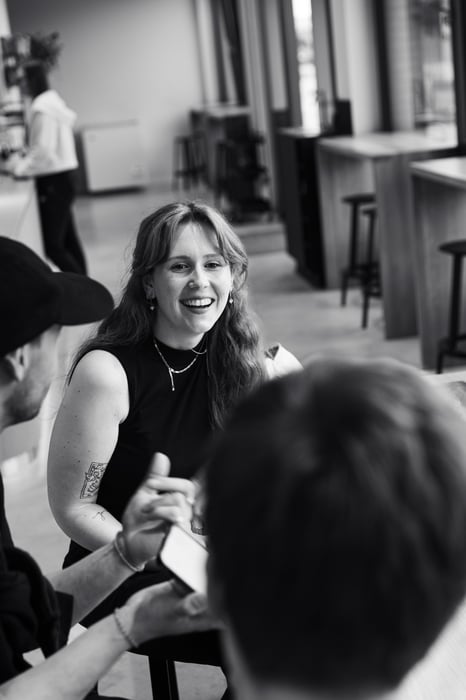
Dustin: For me, toxic masculinity is a big topic.
Pascal: Absolutely.
Dustin: You shouldn’t be put down for bad feelings or told to get over it. That was also one reason why I said I take things that aren’t nice and put them into music.
How about you, Lukas?
Lukas: Dustin wrote all the lyrics himself. So, I kind of slipped into it. The reason it works so well is that we have relatively similar ways of expressing ourselves. When I write lyrics, they go in a similar direction, which is why I could identify well with his lyrics. We recently played a gig as a new trio and recorded a live session together, which will be released soon, and I realized that I really feel the music we make together because it’s so much fun. We played at Typical Coffee in Heidelberg, and there were about 30 people there, and it felt like a whole different world. We played for an hour and had a lot of fun together. I feel a lot when making music and composing and practicing together. I’m not ashamed of feelings.
Dustin: At that gig, it was the first time someone from the audience sang along with the songs. That was a strong realization: Wow, someone has engaged with the songs, and it was very nice to see. Usually, people come to the concerts, and you hope they have fun. Seeing that our music reaches people and connects with them is really cool.
Pascal: I always sing along with the lyrics.
Dustin (laughs): Yes, and that really honors me.
Our first issue is themed "Belonging." It's about the concept of home or homelessness. What does home mean to you? You all come from the region. What evokes the feeling of home for you?
Dustin: Security.
Lukas (ponders): That's a difficult question. My answer might be a bit deeper because I lived in a shared apartment about six months ago, and my best friend moved to France because he's a chef there now. Some other friends had already moved away. I thought a lot about what home means to me. Now that many friends have moved away, do I even want to stay here? After meeting Dustin and Pascal, I realized that home for me is having people around that you like, with whom you feel comfortable, and with whom you can have a good time. I found that here.
Dustin: Yes, and that’s when you feel at home.
Pascal: I had to think about it because the question is difficult. I believe that home isn't a place but the environment and the people who give you the feeling of home.
Dustin: We're back to feelings again.
Fabio: For me, it’s also security.
Mäx: Yes, totally. When we discussed the next issue, we also noticed that home for us isn't necessarily a place but the people who accompany you in life. Family, friends and places you associate with things.
Pascal: Yes, and also memories.
Which of your songs would you associate with the theme of home? Maybe a song that evokes a feeling of home or comfort.
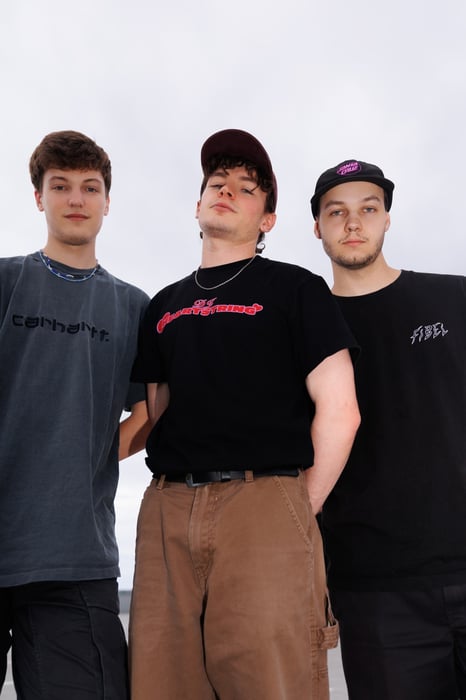
Dustin: "Wir werden sehen" (We will see). That might be counterintuitive because it's more about taking a new step in life without really knowing how it will turn out. You just do it because it has to be done, but you also have confidence. To quote the song: "Whether I’m ready for it now, I don't know, we will see." There's also a lot of hope in it. If home gives you security, you can leave it because you have the confidence that you can always go back and have a safety net that will catch you.
Lukas: For me, it would be the same song. It's also about having the security to take a new step, and somehow you already have friends around you at home, which allows you to try new things.
Your debut album was released a year ago. How did the process of the album release change you? You mentioned that you're already working on new music. What have you learned from these experiences for the new process?
Dustin: I’ve learned that you need to take more time.
Pascal: Yes, less stress.
Dustin: You shouldn't force anything. If you want to be creative under pressure and, for example, do the mixing, it's difficult to feel when the album is finished or perfect. Sometimes I still listen to the album and find parts that I would do differently now.
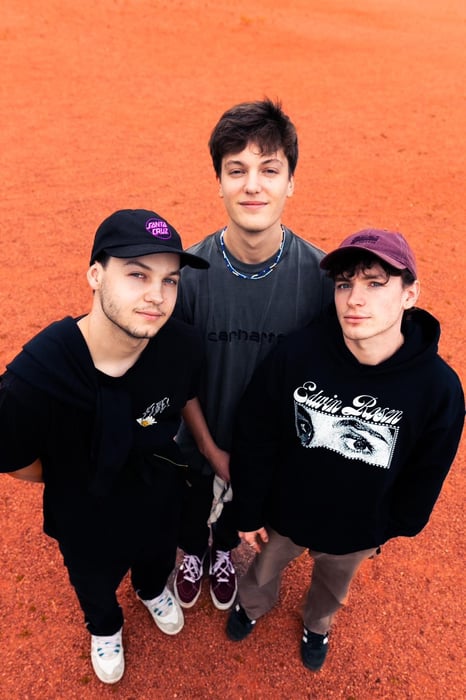
Pascal: The decision of when an album is finished is always a snapshot. Of course, you would do things differently in retrospect.
Dustin: The time before the release concert and the release itself was very stressful. We had to prepare everything and decide how we wanted to do the show. It wasn’t just about finishing the album but also figuring out how to design the show. Pascal and I clashed a few times, but in the end, we hugged it out. The most important lesson is to take your time. I always said the first album had to be perfect. Listening to it now, I know it's perfectly imperfect, but there are things I would have liked to change.
Lukas: The original plan was for me to just play live, so I didn’t contribute much to the sound. For the future, I think I will contribute more, especially regarding synthesizer sounds. I’m not sure how much I’ll be involved in songwriting; time will tell, but I know Dustin can always ask me for a third opinion on various questions if he wants.
Dustin: We also worked on his project, and I noticed that Lukas has a similar way of writing and a similar sense of aesthetics. The more I work with him, the more comfortable I feel about doing something together for BitterBlau and experimenting together.
We have a Spotify playlist for our readers. What song should they listen to? Which one shouldn’t they miss?
Dustin: The song that most inspired me for the album's sound was Tame Impala's "List of People to Try and Forget About."
Lukas: I discovered the artist Zartmann about two weeks ago. I really like him, and I would recommend the song "Und Du suchst noch überall, alles was mal von mir war" (And you’re still looking everywhere for everything that was once mine). It hit me so hard that I listened to it all day yesterday and today. It's beautiful.
Fabio: "Tanz in deiner Wohnung" (Dance into your apartment) by Paul Wetz has accompanied me a lot in the last year.
Pascal: "Ängste haben Arme" (Fears have arms) by Rar and "Gegengift" (Antidote) by Frytz.
The Unseen is excited for what's to come for BitterBlau. We can't wait to see and report about their future performances and releases!
You can find these song recommendations on our Artists Faves-Playlist on Spotify.

